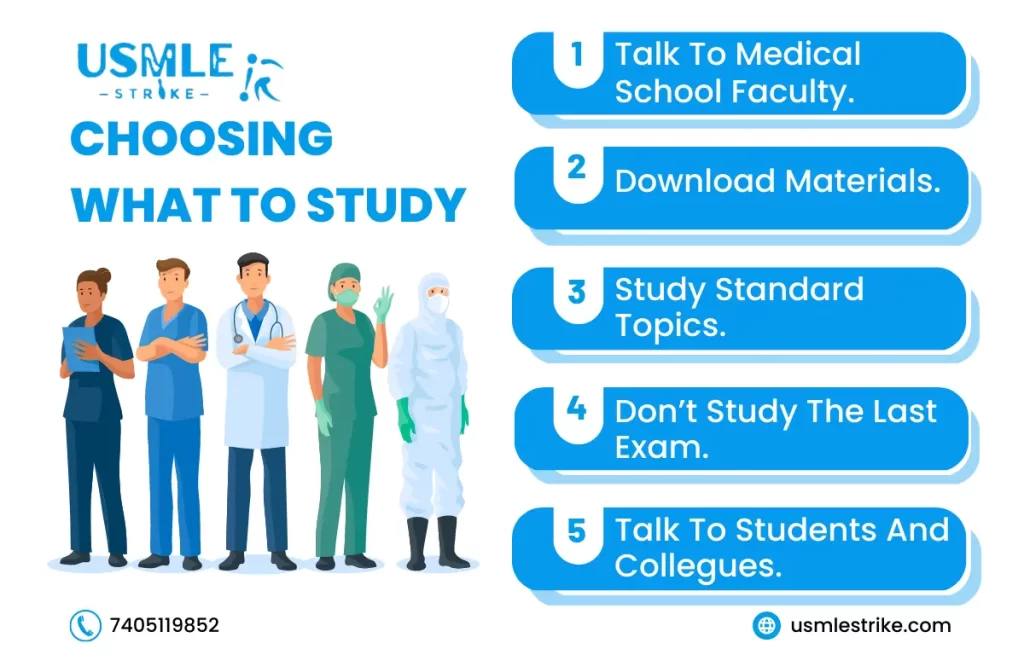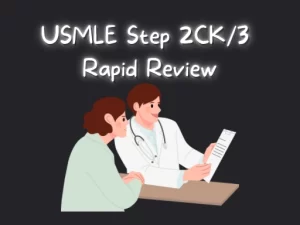Are you planning to take the USMLE Step 1 exam? If so, you’re likely feeling a mix of excitement, anticipation, and perhaps a bit of anxiety. After all, the USMLE Step 1 is a comprehensive exam that covers a vast amount of material, and preparing for it can be a daunting task. But with the right strategy and approach, you can manage the process and increase your chances of success. In this Article, we’ll provide some tips and ideas for the USMLE Step 1 preparation plan.

When should I Start Preparing?
- USMLE Step 1 tests cover the basic science in the first two years of medical school almost for all International Medical Graduates (IMGs). It is best you can opt for this Step 1 exam as soon as you complete the second year of medical school.
- During that time, when all the concepts are still fresh in your mind, there is no need to worry if you could not attempt the exam during your second year of medical school. It is important to remember that you can still take the USMLE Step 1 exam after your graduation.
- But mostly, it is good to give an exam as soon as you complete your second year of medical school. In case, if there is a delay, you can opt for this Step 1 exam later. You can always make use of additional resources like textbooks and/or video lectures to clarify your doubts. Taking the help of additional resources is an effective way for the USMLE Step 1 preparation plan.
6 months Study Plan
| Month | Weeks | Focus Areas |
| Month 1 | Weeks 1-4 | Foundation: Biochemistry, Physiology, Behavioral Science |
| Month 2 | Weeks 5-8 | Systems Integration: Cardiovascular, Respiratory, Renal |
| Month 3 | Weeks 9-12 | Systems Deep Dive: GI, Musculoskeletal, Neurology |
| Month 4 | Weeks 13-16 | Multisystem Approach: Immunology, Microbiology, Psychiatry |
| Month 5 | Weeks 17-20 | Comprehensive Review: UWorld, First Aid, Pathoma |
| Month 6 | Weeks 21-24 | Intensive Practice: Full-length exams, Weakness Review |
| Final Polish: Anki, Rapid Review, Test-Taking Strategies | ||
| Wellness Focus: Balance, Exercise, Mental Health |
Subjects for the USMLE Step 1 include
The subjects that have to be concentrated for USMLE Step 1 preparation include:
- Biochemistry
- Anatomy
- Physiology
- Microbiology and Immunology
- Pathology
- Pharmacology
- Biostatistics and Epidemiology
- Medical Ethics
- Behavioral Science
- Genetics and Aging
Right Plan for your USMLE Step 1 Preparations
The USMLE Step 1 exam is a critical milestone for medical students as it is a critical assessment of their foundational knowledge in the basic sciences. As such, it is essential to choose the USMLE Step 1 preparation plan through appropriate resources to help you prepare adequately for the exam.
Here are some tips on how to choose appropriate resources for the USMLE Step 1 exam:
Understand Your Learning Style
Everyone has their own unique learning style, and it’s important to choose resources for the USMLE Step 1 exam that align with your preferred learning style. For example, if you’re a visual learner, you might prefer resources that include diagrams, flowcharts, and illustrations. On the other hand, if you’re an auditory learner, you might prefer resources for USMLE Step 1 preparation that include audio or video lectures. Understanding your learning style can help you choose resources that are most effective for you.
Consider Your Budget
USMLE Step 1 preparation plan can be expensive, with many resources requiring a significant financial investment. It’s important to consider your budget when choosing resources and to look for options that fit within your budget. There are many free resources available online, including review articles, videos, and study guides, that can supplement your preparation without breaking the bank.
Research Your Options
Before investing in any resource, it’s important to research your options thoroughly. Look for reviews and recommendations from other students who have used the resource, and consider the reputation of the publisher or company. Don’t be swayed by flashy marketing or promises of quick results; instead, look for resources that are well-regarded by other students and have a track record of success.
Choose Resources Wisely
The USMLE Step 1 is a comprehensive exam that covers a wide range of topics. When choosing resources, it’s important to choose options that cover the full exam before creating a USMLE Step 1 preparation plan by starting from Anatomy and Physiology to Pharmacology and Pathology. Make sure the resources you choose are comprehensive and cover all the topics that will be on the exam.
Opt for Interactive and Engaging Resources
Learning can be more interesting and compelling when it’s highly engaging. Look for resources that include interactive quizzes, flashcards, and other features that make learning more fun and engaging. This can help you to retain information better and stay motivated throughout your USMLE Step 1 preparation.
USMLE Step 1 Preparation Course
A USMLE Step 1 preparation course enhances understanding of medical sciences applicable in clinical settings. These courses typically include comprehensive content reviews across subjects like anatomy and pathology, extensive practice questions, multimedia resources, adaptive learning technologies, and personalized study plans. Popular providers include Kaplan Medical, UWorld, and First Aid/USMLE-Rx, known for their in-depth resources and extensive question banks. When choosing a prep course, consider your learning style, budget, and specific needs. Also, seek recommendations and explore free trials to find the best fit for your exam preparation.
What to Study and How to Study?
USMLE Step 1 preparation plan requires a significant amount of time, effort, and dedication. It is essential to study strategically and focus on the most important topics to increase your chances of success. There are various methods to determine what topics are likely to appear on your examination.
- Engage with the faculty at your medical school for valuable insights into the exam before the USMLE Step 1 preparation plan. With access to previous exams and item analysis reports, they possess the knowledge to guide you on the crucial topics relevant to their field.
- Obtain practice materials from credible sources such as the NBME or USMLE website to understand the exam structure. While new topics are often incorporated, it is advisable to focus on studying standard topics that have held prominence in the scientific and lay communities for a minimum of two years.
- Avoid the mistake of solely studying for the last exam after framing the USMLE Step 1 preparation plan. The content of the exam varies from year to year, and even within the same year, each candidate may receive a different set of questions.
- Speak with former candidates and colleagues who have taken the exam in the past. They can provide insight into the high-yield content areas that you should prioritize. However, keep in mind that candidates may overestimate the importance of topics they struggled with and recall incorrectly answered questions more readily.
Choosing How to Study for the USMLE Step 1 Exam
Studying for the USMLE Step 1 exam requires careful planning and a comprehensive approach. Here are some tips to help you choose an effective study strategy:
- Resource Selection: Opt for reputable study materials like UWorld, First Aid, and Pathoma.
- Study Plan: Devise a realistic schedule balancing content review, practice questions, and assessments.
- Active Learning: Engage in active learning techniques, such as flashcards and teaching concepts to others.
- Assessment Tools: Utilize self-assessment exams to gauge progress and identify weak areas.
- Consistent Review: Regularly review previously covered material to reinforce understanding.
- Simulated Exams: Incorporate full-length practice exams to simulate test-day conditions.
- Anatomy of Questions: Understand the structure and format of USMLE questions.
- Wellness: Prioritize self-care to maintain mental and physical well-being during preparation.
- Adaptability: Adjust the study plan based on individual strengths and weaknesses.
- Seek Guidance: Consider seeking advice from peers or mentors who have successfully completed the Step 1 exam.
How Long Does it Take to Prepare for USMLE Step 1?
The duration required for USMLE Step 1 preparation can vary depending on several factors, including individual study habits, prior knowledge, and the amount of time available for dedicated preparation. Generally, it is recommended to allocate a significant amount of time to adequately cover the vast amount of material tested on the exam. Many medical students dedicate a dedicated study period of approximately 6 to 12 weeks to prepare for the Step 1 exam. During this time, students typically engage in intensive study, utilizing review resources such as textbooks, online question banks, and review courses. The exact length of the study period may vary depending on personal circumstances and individual learning needs.
Read also: CV for USMLE
Tips on USMLE Step 1 Preparation Plan
- Begin Ahead of Time: The USMLE Step 1 exam encompasses an extensive range of information. It’s crucial to allocate ample time for studying, ensuring a well-paced approach. This allows a comprehensive understanding of the material, identification of weak areas, and the flexibility to adapt the USMLE Step 1 preparation plan accordingly. Consider enrolling in a structured and effective USMLE Step 1 preparation course to optimize your study strategy and increase your chances of success in this challenging exam.
- Understand the Exam Format: The USMLE Step 1 exam consists of 280 multiple-choice questions, divided into seven 60-minute blocks. You have a total of eight hours to complete the exam, which includes a 45-minute break after block three. Understanding the exam format will help you create a USMLE Step 1 preparation plan to pace yourself accordingly.
- Use Exam Content Outlines: You should know that the content outlines for the USMLE exam covers the details of the topics and subtopics on the exam. Use these outlines for your study plan and prioritize topics that are most heavily tested. It is also essential to be realistic and give yourself enough time to cover all the material thoroughly.
- Focus on High-Yield Topics: High-yield topics are frequently tested on the USMLE Step 1 exam. These include Biochemistry, Pharmacology, Microbiology, Pathology, and Physiology. Ensure you have a thorough understanding of these subjects and their high-yield concepts because this will help you answer questions even if you do not remember all the details.
- Master Anatomy: Anatomy is a critical subject on the USMLE Step 1 exam and requires mastery of both gross and microscopic anatomy. It is essential to study Anatomy early and often and incorporate various resources such as books, images, and online resources.
- Practice Questions: Practice questions are an excellent way to reinforce your understanding of key concepts and identify areas where you need additional focus. Use question banks during the USMLE Step 1 preparation plan by utilizing UWorld and USMLE Strike question banks, which provide high-quality practice questions and detailed explanations for both correct and incorrect answers.
- Review Your Weaknesses: Regularly assess your weaknesses and spend extra time reviewing these topics. Utilize flashcards, diagrams, and other active learning methods to help retain the information.
- Utilize Active Learning Methods: Active learning methods such as drawing diagrams, creating study groups, and explaining concepts to others can help solidify your understanding of the material and increase your retention on the USMLE Step 1 preparation plan.
Remember that the USMLE Step 1 exam is a comprehensive assessment of your foundational knowledge, and it is important to study strategically and prioritize the most important topics. With a well-planned study strategy and dedication, you can achieve success on the USMLE Step 1 exam.
Another thing you can add to it your USMLE Step 1 preparation, is to practice a few sample questions like:
How to Choose the Best Resources for USMLE STEP 1?
Choosing the best resources for USMLE Step 1 preparation can be a daunting task, as there are numerous options available. Here are some tips to help you choose the best resources:
- Ask for Recommendations: Consult with your peers or seniors who have taken the USMLE Step 1 exam to get an idea of what resources they found helpful. You can also ask your professors or advisors for their recommendations.
- Check Online Reviews: Look for online reviews of the resources you are considering. Check for feedback on the quality of the content, the ease of use, and the effectiveness of the resource.
- Look for Comprehensive Resources: Choose resources that cover all the important topics and provide detailed explanations. Comprehensive resources for USMLE Step 1 preparation can help you build a strong foundation of knowledge and increase your chances of success.
- Choose Resources that Match Your Learning Style: Everyone has a unique learning style, and it’s important to choose resources that align with your USMLE Step 1 preparation plan. For example, if you are a visual learner, choose resources that have diagrams, charts, and images. Consider incorporating a specialized USMLE Step 1 preparation course that caters to diverse learning styles, providing targeted content and enhancing your overall comprehension and retention during the exam preparation process.
- Consider the Cost: Some resources can be expensive, and it’s important to consider the cost before making a decision. However, keep in mind that investing in high-quality resources can pay off in the long run.
- Use Official Resources: The USMLE website provides official resources, such as practice tests and sample questions, which can be helpful in preparing for the exam.
Remember, there is no one-size-fits-all approach to studying for the USMLE Step 1, so it’s important to choose resources that work best for you.
Basic USMLE Step 1 Study Structure
Here is a basic study structure that many students find helpful:
- Content Review: Thoroughly cover Anatomy, Behavioral Sciences, Biochemistry, Microbiology, Pathology, Pharmacology, and Physiology.
- Question Banks: Utilize reputable question banks like UWorld to practice applying knowledge.
- Flashcards: Create or use flashcards for quick recall of key facts.
- Practice Exams: Take full-length practice exams to simulate test conditions.
- Review Weak Areas: Focus on areas of weakness identified through practice exams.
- Active Learning: Engage in active learning through discussions, teaching, or study groups.
- Consistent Schedule: Establish a consistent and realistic study schedule.
- Breaks: Incorporate breaks to avoid burnout.
- Mock Exam Day: Simulate exam conditions before the actual test.
- Review Resources: Use high-yield review resources like First Aid for the USMLE Step 1.
Conclusion
You can refer to this Article as it serves as an ultimate resource for USMLE Step 1 preparation plan. Not only will you gain insight into developing a robust preparation plan, but you’ll also learn about available courses to aid in your USMLE Step 1 journey. Follow our expert tips to establish a solid study regimen and approach the exam with confidence.
Read Also: Step 1 High Yield Topics





